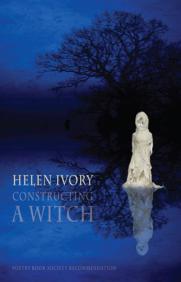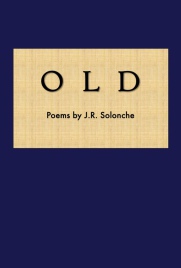
Helen Ivory, Constructing a Witch,
Bloodaxe Books Ltd, 2025,
ISBN: 978-1-78037-719-3, 90pp, £12.99.
One suspects that the trend toward misogyny, or at least the relentlessness of the bro culture’s drive to male dominance and the United States’ rollback of reproductive rights by the Supreme Court and state legislatures, may have something to do with Helen Ivory’s consideration of the topic of witchcraft and the historical targeting of women as evil. The poem “Prick” takes a 2022 headline from a story in Vice.com, after the Dobbs decision that struck down abortion rights, as its epigraph. “‘Witches’ and ‘Whores’: The Far Right Is Already Celebrating the End of Abortion.”
In any case, whatever the impetus, Constructing a Witch is a thorough meditation on the demonization of women, or at least their subjugation, even in western culture, and the peculiarities of the female body – the onset of menses, the effects of menopause – that are so often taboo subjects, a fact which contributes to the “othering” of women.
Constructing a Witch is a unique assembly of various styles. There are both poems in verse and short prose pieces. Moreover, Ivory, a visual artist as well as a poet, also includes ten collages in the book, one that opens the collection – “{By the slant of her tone.}” – and one that closes it – “{fire as fire}” – and eight others throughout.
But thematically, she begins at the beginning. That first collage, a hand with an eye at the palm, gives a “warning” to the reader spelled out in ransom-note cut ups: “Turn back now if you fear the devil,” and the piece concludes:
For oh she is the weaker vessel:
the devil’s gateway to your thirsty hothouse.
The next piece, one of the short prose paragraphs titled “The Waking,” continues the warning. “I hold up those rekindled women and we reel, we howl, and we shoot our filthy mouths off.”
And then to state the argument that drives the book: “Some definitions of Witch,” which is a series of unflattering 4-line verse statements. “She is a scapegoat for bad luck,” one ends and another:
A childless wraith
in a child’s picture book.
The worst mother
man ever invented.
“sayer of spells. / Barefoot earth-listener, / older than God or television.” Helen Ivory is certainly not without a sense of humor, grim as the situation may be!
Ivory also cites everybody from William Blake (Proverbs of Hell and The Marriage of Heaven and Hell) and Nancy Downs from The Craft, to The Wizard of Oz (“Only bad witches are ugly,” Glinda the Good says) and The Witch of Endor, who appears in I Samuel when King Saul tries to consult the spirit of the dead prophet Samuel. Poems include epigraphs from Diane Purtkiss’s The Witch in History (“The witch is an antihousewife.”), Revs Kramer and Springer’s 1486 Malleus Maleficarum, John Skelton’s 1545 The Tunning of Elenor Rumming, Silvia Federice’s Caliban and the Witch, Anton Woesnam’s 1525 The Wise Woman, Dante Gabriel Rossetti’s 1887 Lady Lilith, the Reverend Samuel Parris of Salem, Massachusetts, Pliny the Elder’s The Natural History, and more. Ivory’s research is impressive, impeccable.
In the poem, “At the Witchcraft Museum,” which takes place at the Museum of Witchcraft and Magic in Bocastle, England, Ivory describes the poppets – those voodoo dolls into which people stick pins:
Trump-themed, complete with pins and guidance
on how to make his hair fall out
or strike bigotry from his tongue.
If this fails to make a mark, it says –
reverse over him with your car.
There are also Putin poppets for sale. “This item is described as a parody.” Of course it is!
Ivory includes poems about Margaret Johnson, a woman persecuted at the 1633 Pendle Witch Trials, Elizabeth Tibbots, likewise persecuted at Stoneleigh in 1672, Bridget Bishop, tried in Salem. (Ivory points out the irony that Salem is named for the Hebrew word shalom, “peace.”) There are poems about the 17th century Witchfinder General, Matthew Hopkins who had “witches” drowned in Mistley Pond in Essex. “Pendle Tourist,” which describes Ivory’s visit, begins:
Some tellings raise the curtain on old Demdike and Chattox
outwitching each other with herbs and with curses
and selling protections to put bread on their tables.
Some fix on Alizon and her suckling black dog…
Constructing a Witch ends with a series of poems and prose pieces on menstruation – “More thoughts about the moon,” “Summoning Spell: The Body,” “Hang the Moon” (“When I was 13 / it was Hammer Horror; / there was blood, it was springtide.”), “The Menstruous Woman” with its epigraph from Pliny the Elder – and menopause. These latter include “The Change,” “‘Invidia’ (‘Envy’),” “34 Symptoms of Menopause” (“sugar is hex, coffee is bad abracadabra.”), “Thirteen Million,” whose epigraph from NHS England tells us that in the UK that many women are peri or menopausal. It starts:
Right now, I am a list of symptoms so cliché,
it’s as if I’ve peeled off my living skin
and laid down inside a chalked outline.
“Yet the doctors, for the most part, shake their heads,” Ivory writes later in the poem, for they were “not trained for this.” “The Change” elaborates on the symptoms:
Every night your hormones throw a party
you don’t want to attend,
messing with the levels like a bad DJ.
You read that tinnitus is affected by oestrogen’s jitterbug;
that not enough research has been done.
Your skin is a rubber doll plumped up with lava
that’s stumbled into a cold store at 4am.
And doctors’ aren’t trained for this? Yet there are ads on television for such frivolous male problems as Peyronie's disease, a curvature of the penis. Something’s not right!
Ivory’s references to social media enliven the discussion. Women, terrified by their physical experience, consult one another in online chats. It’s almost comforting, except when it’s just terrifying.
Constructing a Witch is witty, charming, informative, and a cri de Coeur.
Charles Rammelkamp
To order this book click here
Charles Rammelkamp is Prose Editor for BrickHouse Books. His latest collection is The Trapeze Of Your Flesh (BlazeVOX Books).
J R Solonche, Old, David Robert Books, 2024, ISBN: 978-1625494689, 108pp, $19.25.
The monosyllabic title says it all. J R Solonche is old. He could not be more explicit about this. Indeed, he even provides us with a number. He is seventy six, or he was when he wrote the title poem. I should point out that later in the collection is another poem with the same title. Its six lines are salutary and invested with an insight that is jaundiced and tender:
Old and older than
and oldest among
and the young (Bless
their hearts!) shall live
to regret all they say
about us.
Aging provides both subject matter and perspective. However, any expectation that Old is deflating or morbid is far from the case. Solonche’s trademark wry humour, his pleasure in the natural world and interactions with close friends and casual acquaintances, overrides any tendency to wallow in senescence. Furthermore, his mind is too sharp and incisive to give any impression of surrender to the perceived negative aspects of becoming old:
I am old, I know.
I do not need to be told,
but tell me anyway.
The twist takes the reader by surprise. The onus is now on us to respond. Later, in a poem addressed to William Carlos Williams, he hits us with these defiant lines:
So here I am, Bill, an old
man speaking of love against
my reason.
Reading Solonche one needs to be nimble. A seemingly straightforward imagist poem, ‘Petunia’, is only five lines but exerts a destabilising effect:
Tenacious, obstinate, stubborn,
purple on purpose more
than ever, the last petunia
in the pot leans over the exact spot
the sun was last afternoon.
The play on ‘last’ is unsettling. While on the surface simplistic, the poem emits a fascination that draws one back to re-read it but each time its enigma remains tantalising and impenetrable. His short poems are often the ones that demand the most engagement from a reader.
Most poetry is perceived as autobiographical and Solonche’s work is no exception to this view. However, the voice that invests these poems is mercurial and elusive, side- stepping the designation of ‘confessional’. Moreover, Solonche’s voice in his poems is often as much an adopted public persona as someone speaking of their life. He seems to recognise that identity is a fabrication not a homogenous entity. ‘Conductor’ for instance is on the surface an autobiographical account of the young Solonche's childhood ambition to become a musical conductor. His parents indulge this ambition and buy him a baton but this dream is never fulfilled. The way the poem concludes is given an existentialist twist:
I happened.
That was not what I wanted.
What is captured here is the aporia of ending up being someone that does not please the self, a familiar enough feeling for many of us. But the way Solonche expresses this embodies a fracture at the core of identity. If you’re disappointed in yourself who is it that is standing in judgement on you, who does that voice belong to? It is with poems like these that Solonche may be legitimately described as a philosophical poet.
Occasionally it might be construed that Solonche is veering into being openly personal but even then he follows the advice of Emily Dickinson, his declared favourite poet, to “Tell all the truth but tell it slant”. Take ‘Dementia’, a short poem that deals with a distressing aspect of becoming older and which has impacted his life for several years now. It gives nothing away about his own circumstances but focuses instead on a particular sound emanating from the room where the person with dementia is lying:
that sound that sounds like pearls chattering
or Rosary beads breathing,
that sound is the grinding of teeth.
While the last line is devastating, the previous configurations of chattering pearls and Rosary beads breathing are astonishing too in their impact. Effects like these are easily overlooked because Solonche favours a pared back style for the most part. The simplicity is deceptive, the artistry restrained but always beautifully deployed.
As I have already pointed out, such depictions of bleakness do not dominate the collection. Solonche is the arch poet of celebrating the fleeting moment. An example of this is ‘It is difficult to say’, a poem which echoes the famous quote from Williams Carlos Williams: “It is difficult to get the news from poems yet men die miserably every day for lack of what is found there.” Spurred on by the pleasure to be gained from a sunny day, Solonche asserts defiantly in the poem’s last line: “It is difficult not to begin.” It is my fervent hope and wish that Solonche keeps on beginning for as long as he is able to overcome any obstacle in his way and for as long as he is able to draw breath. Certainly with his incredible productivity he has amassed enough work already that he could rest upon his laurels. Thankfully I don’t see that being the case any time soon.
David Mark Williams
To order this book click here
David Mark Williams writes poetry and short fiction. He has been shortlisted for the Montreal Poetry Prize and won Second Prize in the New Zealand Poetry Society International Competition. Two collections of his poetry have been published: The Odd Sock Exchange, Cinnamon, 2015 and Papaya Fantasia, Hedgehog, 2018.


